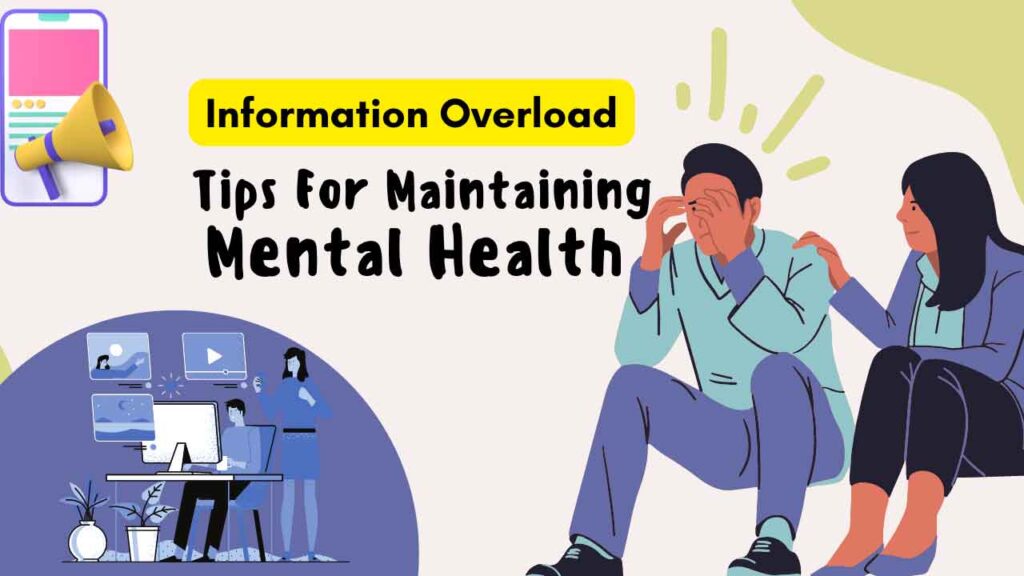Protecting Your Mental Health: 7 Tips for Managing Information Overload in Today’s World

Living in today’s world, it’s easy to feel like we’re constantly bombarded with information from all angles. Social media, news outlets, and other online sources can make it feel like we can never escape the constant stream of information. This information overload can have a negative impact on our mental health and well-being, leading to stress, anxiety, and burnout.
Here are some tips for managing information overload and protecting your mental health:
1. Set boundaries: It’s important to set boundaries around your consumption of information. Determine how much time you want to spend consuming news, social media, and other forms of information, and stick to that limit.
2. Practice mindfulness: Mindfulness is a technique that involves being present in the moment and fully engaged with your thoughts and surroundings. By focusing on the present moment, you can reduce stress and anxiety and improve your overall well-being.
Also Read
Artificial Intelligence in Healthcare: Current Trends and Future Prospects
Top 10 Benefits of Regular Cycling
3. Take breaks: It’s essential to take breaks from consuming information to give your brain a chance to rest and recharge. Take a walk, do some deep breathing exercises, or engage in another activity that helps you relax.
4. Be selective: Not all information is relevant or important to our lives. Be selective about what you consume and prioritize information that is meaningful and valuable to you.
5. Disconnect: Consider taking a break from technology and social media to give your brain a chance to rest and recharge. This can help reduce stress and anxiety and improve your overall mental health.
6. Prioritize self-care: Make sure you’re taking care of yourself by getting enough sleep, eating a healthy diet, and engaging in regular exercise. These habits can help boost your mental and physical well-being and help you better manage information overload.
7. Seek support: If you’re feeling overwhelmed or struggling to manage information overload, don’t hesitate to seek support from a mental health professional or trusted friend or family member.
By implementing these tips and strategies, you can better manage information overload and protect your mental health in today’s world. Remember that it’s essential to prioritize your well-being and take care of yourself in the midst of all the noise and information around us.
Also Read…
Job Interview: 10 Key Steps to Ensure Interview Success
Career in Medicine in India: Best Colleges, Entrance Exams, Specializations, and More
FAQ
Q: What is information overload?
A: Information overload refers to the feeling of being overwhelmed by the sheer amount of information available to us, particularly in today’s digital age. It can lead to stress, anxiety, and difficulty processing information effectively.
Q: How can information overload affect my mental health?
A: Information overload can have a negative impact on your mental health by increasing feelings of stress, anxiety, and burnout. It can also make it difficult to focus, process information effectively, and make decisions.
Q: What are some strategies for managing information overload?
A: Some strategies for managing information overload include setting boundaries, practicing mindfulness, taking breaks, being selective about the information you consume, disconnecting from technology, prioritizing self-care, and seeking support when needed.
Q: How can I reduce my exposure to information overload?
A: You can reduce your exposure to information overload by setting limits on your consumption of news, social media, and other forms of information, being selective about the information you consume, and taking breaks from technology and social media to give your brain a chance to rest and recharge.
Q: When should I seek professional help for managing information overload?
A: If you’re feeling overwhelmed, stressed, or anxious and are having difficulty managing information overload on your own, it may be helpful to seek support from a mental health professional who can help you develop strategies for coping with these feelings and managing the impact of information overload on your mental health.







